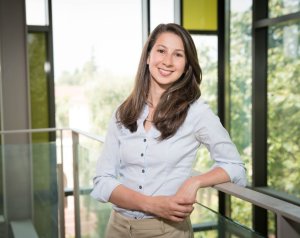Presented By: Michigan Institute for Data and AI in Society MIDAS
MIDAS Seminar Series, ECE, Astronomy , and Women in Computing Co-Present: Katie Bouman, California Institute of Technology
Beyond the First Portrait of a Black Hole

As imaging requirements become more demanding, we must rely on increasingly sparse and/or noisy measurements that fail to paint a complete picture. Computational imaging pipelines, which replace optics with computation, have enabled image formation in situations that are impossible for conventional optical imaging. For instance, the first black hole image, published in 2019, was only made possible through the development of computational imaging pipelines that worked alongside an Earth-sized distributed telescope. However, remaining scientific questions motivate us to improve this computational telescope to see black hole phenomena still invisible to us and to meaningfully interpret the collected data. This talk will discuss how we are leveraging and building upon recent advances in machine learning in order to achieve more efficient uncertainty quantification of reconstructed images as well as to develop techniques that allow us to extract the evolving structure of our own Milky Way's black hole over the course of a night.
Katherine L. (Katie) Bouman is a Rosenberg Scholar and an assistant professor in the Computing and Mathematical Sciences, Electrical Engineering, and Astronomy Departments at the California Institute of Technology. Before joining Caltech, she was a postdoctoral fellow in the Harvard-Smithsonian Center for Astrophysics. She received her Ph.D. in the Computer Science and Artificial Intelligence Laboratory (CSAIL) at MIT in EECS, and her bachelor's degree in Electrical Engineering from the University of Michigan.
Katherine L. (Katie) Bouman is a Rosenberg Scholar and an assistant professor in the Computing and Mathematical Sciences, Electrical Engineering, and Astronomy Departments at the California Institute of Technology. Before joining Caltech, she was a postdoctoral fellow in the Harvard-Smithsonian Center for Astrophysics. She received her Ph.D. in the Computer Science and Artificial Intelligence Laboratory (CSAIL) at MIT in EECS, and her bachelor's degree in Electrical Engineering from the University of Michigan.